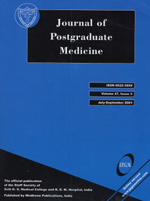
|
Journal of Postgraduate Medicine
Medknow Publications and Staff Society of Seth GS Medical College and KEM Hospital, Mumbai, India
ISSN: 0022-3859
EISSN: 0022-3859
Vol. 49, No. 2, 2003, pp. 110-113
|
 Bioline Code: jp03030
Bioline Code: jp03030
Full paper language: English
Document type: Research Article
Document available free of charge
|
|
|
Journal of Postgraduate Medicine, Vol. 49, No. 2, 2003, pp. 110-113
| en |
Recruitment of Subjects for Clinical Trials after Informed Consent: Does Gender and Educational Status Make a Difference?
Gitanjali B, Raveendran R, Pandian DG, Sujindra S
Abstract
CONTEXT: Researchers and investigators have argued that getting fully informed written consent may not be possible in the developing countries where illiteracy is widespread. AIMS: To determine the percentage of patients who agree to participate in a trial after receiving either complete or partial information regarding a trial and to find out whether there were gender or educational status-related differences. To assess reasons for consenting or refusing and their depth of understanding of informed consent. SETTINGS AND DESIGN: A simulated clinical trial in two tertiary health care facilities on in-patients. METHODS AND MATERIAL: An informed consent form for a mock clinical trial of a drug was prepared. The detailed / partial procedure was explained to a purposive sample of selected in-patients and their consent was asked for. Patients were asked to free list the reasons for giving or withholding consent. Their depth of understanding was assessed using a questionnaire. Chi-square test was used for statistical analyses. RESULTS: The percentages of those consenting after full disclosure 29/102 (30%) and after partial disclosure 15/50 (30%) were the same. There was a significant (p=0.043) gender difference with a lesser percentage of females (30%) consenting to participation in a trial. Educational status did not alter this percentage. Most patients withheld consent because they did not want to give blood or take a new drug. Understanding of informed consent was poor in those who consented. CONCLUSIONS: The fact that only one-third of subjects are likely to give consent to participate in a trial needs to be considered while planning clinical trials with a large sample size. Gender but not educational status influences the number of subjects consenting for a study. Poor understanding of the elements of informed consent in patients necessitates evolving better methods of implementing consent procedures in India. (J Postgrad Med 2003;49:110-113)
Keywords
Clinical trials, informed consent, gender, educational status
|
| |
© Copyright 2003 - Journal of Postgraduate Medicine. Online full text also at http://www.jpgmonline.com
Alternative site location: http://www.jpgmonline.com
|
|
